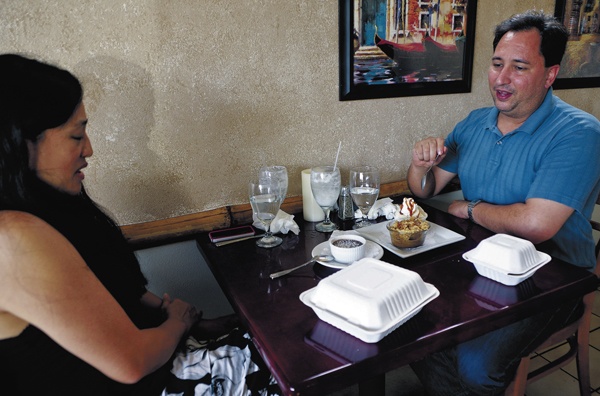LIHUE — In 2009, the Surfrider Foundation Kauai Chapter and Zero Waste Kauai campaigned for the County of Kauai to ban the use of plastic shopping bags. And that’s exactly what the county did. Today, the two organizations are teaming
LIHUE — In 2009, the Surfrider Foundation Kauai Chapter and Zero Waste Kauai campaigned for the County of Kauai to ban the use of plastic shopping bags.
And that’s exactly what the county did.
Today, the two organizations are teaming up again, this time with their sights set on another single-use plastic — Styrofoam.
The campaign hopes to stop island restaurants from using of non-biodegradable containers.
“It would be nice to have 100 percent compliance,” said Gordon LaBedz, treasurer of Kauai Surfrider. “If we don’t get that, we’re asking for the County Council to take some action.”
For the last two months, a new subcommittee of Kauai Surfrider — headed by LaBedz — has been meeting twice a month to discuss its Styrofoam-free vision.
“Obviously, we see the same concerns as Surfrider does,” said Pat Gegen, chair of Zero Waste. “It’s a single-use item that has alternatives.”
Of the nearly 250 restaurants on Kauai, about 20 have already done away with Styrofoam containers, according to LaBedz, who hopes that number will increase tenfold.
“For us here on Kauai, it’s primarily a litter problem and a health problem,” he said.
While they do not biodegrade, plastics, including Styrofoam, break down into small particles that persist in the ocean, absorb toxins and enter our food chain through fish, sea birds and other marine life, according to information on Surfrider’s “Rise Above Plastics” campaign site.
In fact, they account for 90 percent of floating marine debris and kill 1.5 million marine animals each year.
“There are no microbes that eat plastic up, so every piece that’s been made is still on the planet,” LaBedz said.
Using volunteers, Surfrider and Zero Waste plan to survey every Kauai restaurant and take-out place, asking one simple question — do they use Styrofoam?
Those that do will be given fact sheets about the negative effects of Styrofoam, as well as a list of alternative products and where to buy them. Those already using compostable containers will be put on a list to be distributed throughout the community.
“Primarily, we want to patronize those that use compostable containers,” LaBedz said.
One restaurant that has been at the forefront of the movement is Kauai Pasta. Gabe Zingaro, manager of the Lihue location, is a former owner of the now-closed vegan eatery, Blossoming Lotus — one of the first to utilize compostable take-out containers.
Zingaro has taken his Styrofoam-free business model along with him. About a year ago, Kauai Pasta made the switch.
Getting others to do the same, Zingaro said, comes down to a winning combination of public pressure and providing affordable alternatives.
Another long-time compostable user is Hanalei Taro and Juice Co., according to co-owner Brad Nakayama.
While the alternative containers have been a significant cost increase for the company, Nakayama said it has been a “win-win” for everyone.
In addition to the take-out boxes, the company’s cups, utensils and even straws are made of compostable materials.
“We got a lot of pressure to make the change,” he said.
While compostables often cost five to 10 times as much as their Styrofoam counterparts, Gegen said it is worth it. Right now, all those containers are ending up in the landfill.
“You really can’t recycle Styrofoam well,” he said. “From what I understand, it takes as much or more energy to recycle Styrofoam as it does to make it in the first place.”
Gegen expects the subcommittee to have all Kauai restaurants surveyed by the end of the year, and said the effort is really a public campaign to promote environmentally conscious restaurants working to cut down on waste.
Info: kauai.surfrider.org


